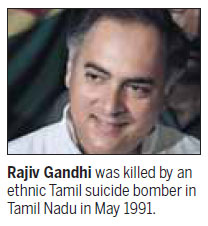Court halts release of 3 Gandhi killers
India's top court stopped the government of Tamil Nadu state on Thursday from releasing three of the seven prisoners serving life sentences for the 1991 assassination of former prime minister Rajiv Gandhi, a lawyer said.
The state ruled on Wednesday that the seven should be released because they have served more than 20 years in prison.
Critics immediately attacked the decision, saying it was a transparent attempt to win over Tamil voters in this year's national elections.
The federal government petitioned the Supreme Court on Thursday to stop the state from freeing the prisoners, with Prime Minister Manmohan Singh saying the move was not legally tenable.
Singh denounced plans to free the killers as an attack on the nation's soul.
But in his first intervention in the case, he said the release of the seven would be contrary to all principles of justice.
"The assassination of Shri Rajiv Gandhi was an attack on the soul of India," Singh said in a statement.
"No government or party should be soft in our fight against terrorism," he added.
The court had commuted on Tuesday the death sentences for three of the convicts, after their lawyers argued that executing them now, after they had served long prison terms, would amount to an unconstitutional double punishment.
Rakesh Dwivedi, a lawyer for the Tamil Nadu government, said the court's order on Thursday applied only to the three prisoners whose sentences had been commuted, and that the state was free to release the other four.

The court asked the federal government to file a separate petition regarding the fate of the four prisoners not covered by Thursday's decision, the Press Trust of India reported.
Gandhi was killed by an ethnic Tamil suicide bomber in Tamil Nadu in May 1991 as he campaigned for a return to the post of prime minister. He was 47 years old. Seventeen other people, including the bomber, were killed in the attack.
The assassination was orchestrated by Sri Lanka's Tamil Tiger rebels to avenge Gandhi's decision to send Indian troops to intervene in the country's civil war in the 1980s.
Mohan Parasaran, the solicitor-general who argued the federal government's petition on Thursday against the release of the convicts, said he told the Supreme Court that the state government had no authority to free the prisoners.
"The appropriate government to consider the granting of remission to prisoners is the federal government," he told reporters.
The court scheduled further arguments in the case to be heard on March 6, and the state is unlikely to release any of the seven prisoners - six men and one woman - before then.
The Tamil Nadu government ruled on Wednesday that the seven should be released because they have served more than 20 years in prison.
AP-AFP
(China Daily 02/21/2014 page12)












